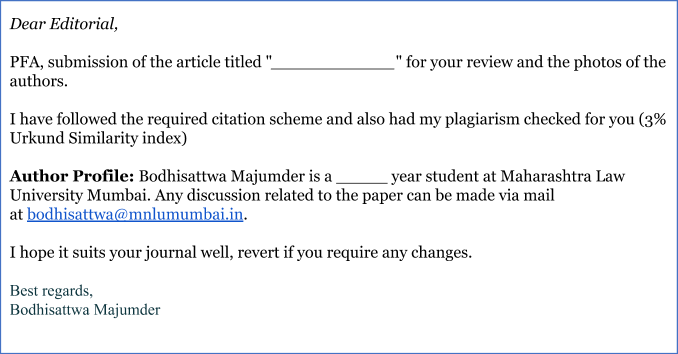The article is written by Bodhisattwa Majumder, from MNLU, Mumbai.
DISCLAIMER: I am not a professional. I am a penultimate year student who takes genuine interest to learn and help others. Every word of this article is based upon my personal experience, and expert advice which I have gained from the Internet, and certain kind individuals whom I have interacted with in my internships, college and LinkedIn. This article is for beginners, who think they have no clue about legal writing.
Table of Contents
Select a topic first, Not the publisher
Yes. Select a topic first. Don’t choose the end first, basing your research topic on a “Call for Paper” would be limiting yourself to their demand, rather than flexing your passion and comfort. Trust me, you will have a lot of journal choices for any type of law you choose.
Take caution! Don’t try to convert your Moot Court Memorials or other assignments into research papers! I have often come across several law students trying to convert their memorials or academic projects into research papers for publications (often sinned that myself too), However, what I have found is, that it is a great setback for budding authors. You might feel that given that as you have already researched that field you have better chances and you will be able to publish easily. Firstly, the topics for the moot research are often not what the publishers or readers want. Secondly, already having worked in a lackadaisical way (projects in my case) brings in boredom and lack of interest and as a result, you are in a hurry to get it done with. After that, the result is a half-hearted submission which has higher chances of rejection. DONT DO THIS. Star afresh. Look for burning issues that align your passion. Research on the requirements of the publishing houses. Consult your professors about the grey areas. Trust me it’ll be much better.
Characteristic of a topic?
The topic should be URI. Unsettled, Relevant and Interesting. All these components are very important and I will tell you why.
Firstly, if it is an already settled topic, then you won’t be able to give any original thought. You would be simply compiling the stuff. You don’t want to do that.
Secondly, if it is 20 years old, nobody cares about it. The recruiters will spot your topic only if it helps them in their practice.
Thirdly, even if it’s a burning issue and unsettled, you will lose interest if its bland and does not match your passion. Take a topic which makes you think.
But, how to find a relevant topic?
It is the most difficult and tenuous process to publish a paper. It has no specific way but I have found the following steps helpful:
- Follow market leaders. Partners, Associates, Firms on LinkedIn. They regularly post the latest issues which they face in practice.
- Follow legal news. Livelaw, Bar&Bench amongst a few.
- Subscribe to Law journals. (might cost a buck)
- Set up Google Alerts on certain keywords.
This will take at least a few weeks. It’s a very boring process but once you get hooked on you will enjoy it.

Research: Where to study from?
You have to develop a knowledge base. This has to be done stepwise.
- Preliminary Knowledge: All the articles you can find on this online through Google Searches, they might sound quirky and local but read what they want to say. Trust me although they are not authentic, but they can be surprisingly precise at times. Very easy to read, so you will not sleep while reading it. This will help you get the basics and set an argument in motion.
- Detailed Reading I: Books. Commentaries from known publishers such as EBC, LexisNexis, Sweet and Maxwell, Bloomsbury etc. They help understand the nitty-gritty of the subject and also understand the evolution of the law. BUT, be aware they are not often updated and latest case laws might be missing. This will help you frame a tentative argument.
- Detailed Reading II: Journals. Bring in the Big Guns. Manupatra, SCC, HeinOnline, West law et al. You will get the most recent, most updates and most authentic information. This will help you substantiate your arguments and provide the authorities. BEWARE, these are often very complex and might make you sleep. Kick the passion!
Drafting: I have an idea, but can’t frame it!
No one can help you here. You have to put in your twelve years of slavery to practice. Some tips on writing:
- Don’t schedule writing AFTER Research. Write simultaneously. Only when you sit down to write, you will know what you NEED.
- Be precise and simple. No need to throw in jargons.
- Don’t copy as it is. Learn to paraphrase on your mind. Read a sentence, close your eyes and type without looking again. You have the inbuilt power of paraphrasing.
- Try to follow a direction. Make a flow chart if needed. Guide the reader.
- There should be a connection and straight flow between the sections.
- CITATIONS: Go to a reputed journal which follows your required citation style, look up in old volumes how they have done it. It’s the easiest way out. Googling never helps here.
Where to send the manuscript?
The second-most difficult job. Finding the appropriate journal. A balance between reputation and success rate is to be ensured. If you are reading this article, most probably too reputed will disappoint you and too bad will be a disappointment after all this hard work.
-
What to look while searching for a journal?
- Genesis: Year of the first publication, the older it is, the better.
- Frequency (yearly, monthly, annually): The more the merrier (higher probability).
- Brands associated with it. Either in the form of reviewer, sponsor, editor, publisher. (Always go for an NLU Journal)
- Region: If it’s a foreign journal, no matter how shitty it is, it will impress the recruiters.
- Outreach: Very difficult to find, but usually google help.
- Nature: If it’s a paid subscription-based, it’s probably good. But not the other way around.
-
How to find a journal?
- Google: Search with the following keywords. “_____Law + Journal + Submission + Call”, Set advanced search and list by recent.
- Call for papers: Lawoctopus, LawLex etc. Check the ads. But beware, a lot of competition here.
- Follow the heard: Check where your friends or seniors have published before. Ask them.
- Connections: If you have them, you don’t need this article.
Sending process
- INSTALL “mailtrack” already. You need to know whether anyone is reading your emails.
- Always use institutional mail ids for these things. Good impression. Don’t keep any other emails apart from professional mails here. If you MISS it, you will regret for weeks.
- Follow up every 7 days. It is a long process, often takes more than months. Be patient, don’t irritate the editor.
- Make an attractive cover letter. Have a professional DP. Place a detailed signature. I will provide mine:

Then?
Relax, and wait for “the mail”. All the best.
Frequently asked Questions
- What do you think is the better route? Writing elaborate papers for journals or writing articles for these online blogs?
You have to do both. Blogs display that you’re up to date and most people read blogs they don’t have time for elaborate papers. But papers look good on CV and displays that you have in-depth knowledge.
- So how many papers one should right?
No watertight answer for this. Based on your capacity. I set a goal of 1 Paper and 2 blogs in two months.
- Any idea what these recruiting firms want to see on your profile?
Based on interviews which I’ve given, they want to see two things:
- Passion: The branch which you are joining, you have some interest on that and you’re just not there for the bucks.
- How to prove you’ve passion? Publications. You’ve applied your mind and you’ve kept in touch with the market
- Who should we ask for guidance?
Different people serve different objects:
- For Topics: Professionals, Teachers.
- For Drafting/where to send: Peers, Seniors.
- Is Co-authorship a good choice?
They are luggage or pullers. Either they will slow you down due to their lack of knowledge or they will move so fast you won’t contribute much. Be clever, go for co-authorship only when the other person knows a person who knows another person. Guaranteed publication, that’s what makes a perfect co-author.
That’s all folks!
LawSikho has created a telegram group for exchanging legal knowledge, referrals and various opportunities. You can click on this link and join:
 Serato DJ Crack 2025Serato DJ PRO Crack
Serato DJ Crack 2025Serato DJ PRO Crack










 Allow notifications
Allow notifications



Thanks a lot !
Thank you so much! This helped me a lot. I literally had no clue what to begin with. Now atleast I can think about writing.